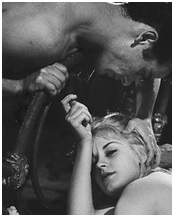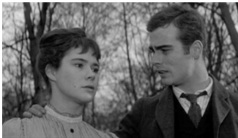|
 |
|
 |
|
|
||
Sons and Lovers - Family and Happiness
Sons and Lovers (1913)
Written by the Englishman, D. H. (David Herbert) Lawrence (1855-1930), pictured right.
How does it relate to Lawrence's life? Paul Morel is D. H. Lawrence. Walter Morel is his father, a Nottinghamshire miner (in Eastwood, Bestwood in the book) Gertrude Morel is his mother (a middle class schoolteacher) Lawrence was profoundly influenced by:
Lawrence's family is pictured right (Lawrence is third from the right).
Fun facts
Key characters Walter and Mrs (Gertrude) Morel, a miner and his wife Paul and William, their children Miriam Leivers and Clara Dawes, Paul’s girlfriends The story Gertrude Coppard (Mrs Morel), a schoolteacher, marries a local coal miner, Walter Morel, but they are very unhappy (pictured right with Paul in the 1960 film). He is often drunk, occasionally violent and hated by their four children. Mrs Morel is ambitious for them all, particularly William, her eldest son, who goes to work in London. But she is mortified by William's death and only becomes very close to his brother, Paul, when he is ill with pneumonia. During his convalescence, his mother takes him to her farmer friends, Mr and Mrs Leivers. He falls in love with their religious and impractical daughter, Miriam, but his mother possessively disapproves of her. This disapproval and their sexless relationship lead Paul to become the lover of Miriam’s friend, Clara Dawes, a suffragette who is separated from her husband, Baxter. Paul's mother dislikes her, too. (Paul and Clara are pictured right below in the 1960 film) Baxter physically attacks Paul, who is badly hurt. After nursing him, his mother dies, leaving Paul distraught and contemplating suicide. He, and his sister, Annie, agree to give her an excessive dose of morphine to relieve her long and painful illness. He reunites Baxter and Clara after realizing that sex was the only reason for his relationship with Clara. He sees Miriam and leaves her again. But he now has the will to live on.
Lessons for family and happiness 1. Parents don’t own their children His mother’s possessiveness (shown by her disapproval of Miriam and Clara) keeps Paul under her control. Paul has what Sigmund Freud (pictured right) called an Oedipus Complex, when mother and son have an unusually close, even sexual, relationship. He is only able to lead his own life when she is dead.
2. Relationships need friendship and passion Paul’s relationships are unsuccessful, because he only gets:
His parents aren’t happy because they:
Paul (Dean Stockwell) and Clara (Mary Ure) are pictured right in the 1960 film
3. Make the most of life Paul:
So he rejects suicide after his mother's death.
4. Knowing people means recognizing their faults Paul’s idealization of his mother blinds him to her snobbish superiority that partly contributes to her disastrous marriage. 5. Self-discipline is vital Paul’s father is destroyed by
6. Don’t let the dead bury the living Paul’s serious illness shows his mother that she must concentrate on him and not his dead brother, William. 7. Empathize with people (even if you don’t like them) Paul empathizes with his mother’s painful last illness, and gives her an overdose. But he forgets his father’s:
Paul's father:
Miriam loses Paul, because she fails to comfort him after his mother’s death. She is:
Paul is pictured right with Miriam (Heather Sears) in the film.
8. Do something worthwhile Paul is a talented artist but finds unfulfilling work with a surgical appliances manufacturer, so becoming a “prisoner of industrialism”. His mother is determined that Paul and William don’t go down the mines, work that is:
Key quote on relationships I shall never meet the right woman while you live, Paul (about his mother)
Key quote on marriage Nothing is as bad as a marriage that’s a hopeless failure, Mrs Morel
Two literature websites to recommend 1. sparknotes.com 2. litcharts.com
|
|
|
||
|
|
||
| Copyright © wisdomtowin.com 2025 All Rights Reserved | ||
|


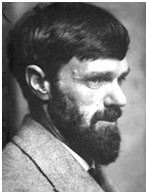
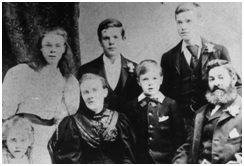
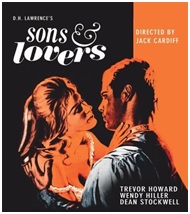
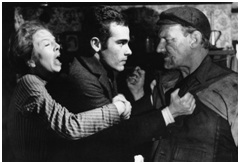
-60film.jpg)

